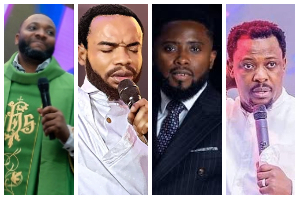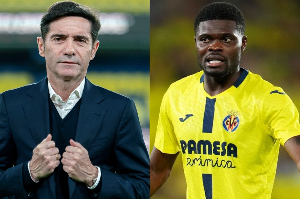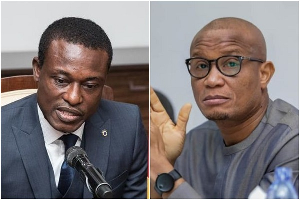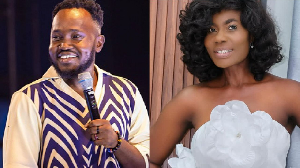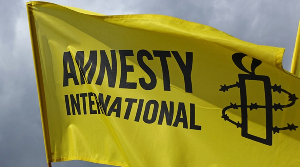Opinions of Thursday, 23 April 2020
Columnist: Nenebi Tony
Fake news is free speech and must be protected
I love the devil. He is my favorite salesman. The devil doesn’t put the product he has on sale in your face where you can see it immediately and decide you hate it. He wraps the product in another product you may like, a Golden Calf, and get your attention with that product. By the time you are done consuming the product you love, you will know you have made a deal with the devil. Hence the saying, the devil is in the details. That’s the best way to sell.
My favorite rapper Kanye West said in Devil in New Dress, “We love Jesus but you done learned a lot from Satan”. A lot of people have learnt a lot from Satan. One group of people who have learnt perfectly the ways of the devil are politicians. Whenever a politician talks, look for the devil in the detail.
The devil's playground
On Sunday, April 19, 2020, the President addressed the nation to lift the ban on the restrictions of movement he placed on the nation. The Golden Calf of the speech was the fact that he lifted the partial lockdown. However you feel about it, that’s all most people will focus on. In the details of his long speech was his take on the spread of what he called fake news, saying spreaders of fake news will be held accountable. He didn’t give any details on how the spreaders of fake news will be held accountable.
However the Minister of Information, Hon. Kojo Oppong Nkrumah alluded to six (6) days earlier. “Fake News is punishable under Ghanaian Law Section 76, Electronic Communications Act, 2008 (Act 775): A person who by means of electronic communications service, knowingly sends a communication which is false or misleading and likely to prejudice the efficiency of life-saving service or to endanger the safety of any person, … commits an offence and is liable on summary conviction to a fine of not more than [thirty-six thousand Ghana Cedis] or to a term of imprisonment of not more than five years or both,” he noted.
PROSECUTION OF SPEECH
The Criminal Act, 1960 had a criminal libel provision (S.185), which has since been repealed. It stated that, “(1) Whoever communicates to any other person, whether by word of mouth or in writing or by any other means, any false statement or report which is likely to injure the credit or reputation of Ghana or the Government and which he knows or has reason to believe is false, shall be guilty of second degree felony.”
Do you see the similarities to Section 76 (1) of Act 775?
In the case of Republic v Tommy Thompson, some Ghanaian journalists were arrested and arraigned before Court for publishing news reports the state deemed a violation of the Criminal Libel Law. The lawyer for the Accused, as a defence, argued that S.185 of Act 29 was, among other things, inconsistent to Article 21 of the 1992 Constitution.
Clause (1) of Article 21 states that, “All persons shall have the right to (a) freedom of speech and expression, which shall include freedom of the press and other media; (b) freedom of thought, conscience and belief, which shall include academic freedom”.
The Supreme Court said, yes the lawyer is probably right but they are not going to rule in his favour. The reason? The Court said every Ghanaian had the responsibility to protect the good name of Ghana. In the list of cases the Supreme Court applied, the controversial In Re Akoto was number one. The Court has the opportunity to repeal the Criminal Libel Law and portions of In Re Akoto but didn’t.
In January 2001, the lawyer for the Accused in the Tommy Thomson case became the Attorney-General of Ghana. On Friday 27 July 2001, Ghana’s parliament unanimously repealed the Criminal Libel and Seditious Laws.
Three months after the repeal of the criminal libel law, the then Chief Justice, Justice Edward Wiredu, at a Ghana Bar Association conference in Sunyani condemned the repeal. He said, the criminal libel law "repeal has made it easier for the media to publish falsehood and rendered the process of seeking redress for defamation difficult and expensive".
We may say that is his personal view and it doesn’t affect the discharge of justice but the posture of the Court on free press has been consistent with his position. In the televised 2012 Election Petition, we saw journalists jailed for daring to take a stance against the Court.
Even though I am an Nkrumaist, I voted for that Attorney-General in 2012 and 2016 when he ran for President specifically because of his stance on the matter of free speech. I am an artist and free speech is an essential ingredient of my work product. “If ever I write, I need the space to say whatever I like”, to quote my idol, Jay-Z.
In January 2017, Attorney-General became the President of Ghana. On Thursday May 3, 2018, which was World Press Freedom Day, the Tommy Thompson’s lawyer-turn-Attorney General-turn-President said, the highlight of his legal and political career was leading the charge to get the Criminal Libel Law repealed.
The portions of Act 775 which allows for the prosecution of fake news contradicts what the President, then as a lawyer and later as Attorney-General fought for. In April 2020, that same President is leading a government that is threatening to jail people for their speech. You think you know somebody…
FAKE NEWS IS FALSE SO WHAT
Article 21(1), which guarantees Freedom of Speech for every Ghanaian falls under the Human Rights chapter, Chapter 5, of the Constitution. Chapter 5 ends with Clause (5) of Article 33, which states that, “The rights, duties, declarations and guarantees relating to the fundamental human rights and freedoms specifically mentioned in this Chapter shall not be regarded as excluding others not specifically mentioned which are considered to be inherent in a democracy and intended to secure the freedom and dignity of man.”
Clause (5) of Article 33 allows the Court to have a broad interpretation of Human Rights. For example, in the 2016 case of Sagoe-Moses v The Minister of Transport, the Human Rights High Court ruled that “every person in Ghana has the inalienable right to information including official information”, even though the Right to Information bill had not yet been passed yet.
Justice Yeboah relied heavily on decisions by the European Human Rights Court and decisions by other democratic jurisdiction. I am following his lead by relying on decisions in other jurisdiction relevant to my course.
In 1996, the US Congress decided to regulate the internet by passing Acts that dealt with matters on the internet. One of those Acts was known as the Communications Decency Act (CDA) made it a crime to publish pornography on the internet for minors to see.
That’s a good law right? On the surface, yes. A law against publishing porn for kids to see. It was an attempt to protect minors from explicit material on the Internet. However the devil is in the detail. In the case of Reno v ACLU, the US Supreme Court ruled unanimously that the provision was a violation of the Freedom of Speech. The US Supreme Court viewed the CDA as “a content-based blanket restriction on speech". You cannot give the government the power to police the content of people’s speech. It is a slippery slope. The decision of the US Supreme Court was to enforce the notion THAT FREEDOM OF SPEECH IS TO PROTECT SPEECH WE HATE, NOT SPEECH WE LIKE.
We all hate fake news, at least I do. My friend and mentor, Obour, was a victim of a fake news character assassination over the death of his father. We are still working of getting people to see the truth of the matter.
However I don’t think people should be stopped from sending news, any news, whether we perceive it to be fake news or not. Spreading information on social media should be subject to the same shield law that protects journalists from revealing their sources. Why? The Blackstone Ratio. Justice Blackstone stated that “It is better that ten guilty persons escape than that one innocent suffer.”
Like US Supreme Court Justice Kennedy said in the United States v Alvarez case in which the Court struck down a portion of the a US law that criminalized false statements about having a military medal, “Permitting the government to decree...speech to be a criminal offense, whether shouted from the rooftops or made in a barely audible whisper, would endorse government authority to compile a list of subjects about which false statements are punishable.”
The Harvard Journal of Law and Technology published an article titled “The constitutionality of criminalizing false speech made on social networking sites in a post-Alvarez, social media-obsessed world” in the Fall of 2017.
It stated in the article that, “In 2012, the Supreme Court issued its United States v. Alvarez decision, in which the Court struck down the Stolen Valor Act of 2005, which made it a crime to falsely claim receipt of military decorations or medals. In so holding, the Court established a First Amendment right, in some circumstances, to lie. Thus, Alvarez provides powerful support for the notion that some lies spread on social media may be protected. Additionally, the very nature of the internet limits the scope of the harm caused by lies made on social media. Although lies may be rebroadcast many times in a matter of minutes, social media subscribers are able to easily vet and rebuff falsehoods with just a click of a mouse. This self-correcting — or, more accurately, crowd-correcting — mechanism often allows social media to strike down lies before they travel too deeply into cyberspace. Thus the concern that yelling “fire!” may lead to significant and widespread harm may be far less salient in cyberspace than in a crowded theater.”
YES, WE CAN
The argument people always make when you bring up global best practice in matters of rule of law is, “our democracy is too young for that”, “Ghana is not ready for that” “Our people are different.” No, we are not.
Ghanaians are stronger than we are given credit for. Our young democracy has taken more hits than many older democracies and survived it. We have had a situation where the opposition because it didn’t have seats in Parliament used the courts to challenge the constitutionality of Acts of Parliament and acts of government. We have had a former military leader’s party lose an election and handing over power peacefully. We had a president die in office and his vice sworn in office as president hours later. We have had the decisions of the Electoral Commission challenged in court, even a presidential election. We have had a sitting president lose election and hand over power peacefully. All these situations have led to wars in other countries. For our leaders to act like we are not matured enough to be given our full rights is disrespectful and condescending.
Usually when government says something is fake news, they are only condemning it because it is not in line with the narrative they seek to promote. Former US President John F. Kennedy once said, “A nation that is afraid to let its people judge the truth and falsehood in an open market is a nation that is afraid of its people.” In short, allow Ghanaians to judge for themselves what is fake news and what is not.
Section 76 of Act 775 is a content-based blanket restriction of speech and should be repealed.


